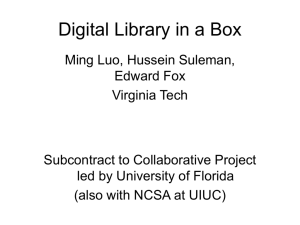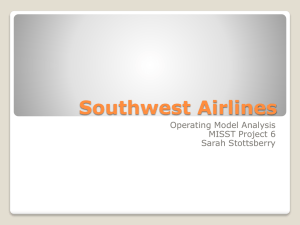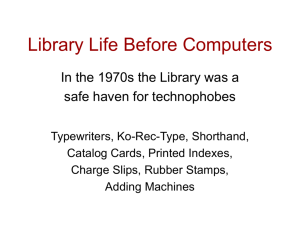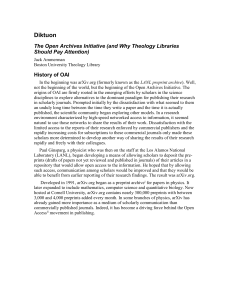oai-2.0-adv-final - Old Dominion University
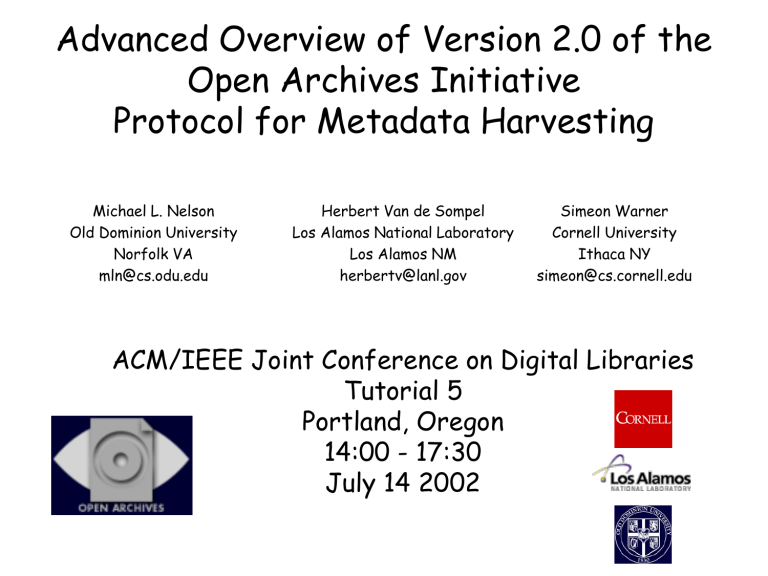
Advanced Overview of Version 2.0 of the
Open Archives Initiative
Protocol for Metadata Harvesting
Michael L. Nelson
Old Dominion University
Norfolk VA mln@cs.odu.edu
Herbert Van de Sompel
Los Alamos National Laboratory
Los Alamos NM herbertv@lanl.gov
Simeon Warner
Cornell University
Ithaca NY simeon@cs.cornell.edu
ACM/IEEE Joint Conference on Digital Libraries
Tutorial 5
Portland, Oregon
14:00 - 17:30
July 14 2002
Scope and Focus
• This Tutorial is not…
– an introduction to OAI-PMH
– a listing of all the wonderful projects that use
OAI-PMH
– a discussion of the merits of metadata harvesting vs. distributed searching
• A passing familiarity is assumed for:
– OAI-PMH 1.x
– Dublin Core
Outline
• How 2.0 evolved from SFC and 1.x
– people, processes, events
• What’s new in 2.0
– comparison with 1.x
• Guidelines, recommendations, best practices for 2.0 implementations
– harvesters, repositories, aggregators, optional containers
• Novel applications of OAI-PMH
Spoiler: What’s New in 2.0?!
• Good news: OAI-PMH is still
Six Verbs + DC
• Incremental improvements
– single XML schema
– ambiguities removed
– more expressive options
– cleaner separation of roles & responsibilities
• Bad news: not backwards compatible with 1.1
from
Santa Fe Convention to
OAI-PMH v.2.0
Santa Fe convention
OAI-PMH v.1.0/1.1
nature experimental verbs Dienst requests HTTP GET/POST responses transport
XML
HTTP metadata about model
OAMS eprints metadata harvesting experimental
OAI-PMH
HTTP GET/POST
XML
HTTP unqualified
Dublin Core document like objects metadata harvesting
OAI-PMH v.2.0
stable
OAI-PMH
HTTP GET/POST
XML
HTTP unqualified
Dublin Core resources metadata harvesting
Santa Fe Convention [02/2000]
• goal: optimize discovery of e-prints
• input:
• the UPS prototype
• RePEc /SODA “data provider / service provider model”
• Dienst protocol
• deliberations at Santa Fe meeting
[10/99]
OAI-PMH v.1.0 [01/2001]
• goal: optimize discovery of document-like objects
• input:
• SFC
• DLF meetings on metadata harvesting
• deliberations at Cornell meeting [09/00]
• alpha test group of OAI-PMH v.1.0
OAI-PMH v.1.0 [01/2001]
• low-barrier interoperability specification
• metadata harvesting model: data provider / service provider
• focus on document-like objects
• autonomous protocol
• HTTP based
• XML responses
• unqualified Dublin Core
• experimental: 12-18 months
Selected Pre- 2.0 OAI Highlights
• October 21-22, 1999 - initial UPS meeting
• February 15, 2000 - Santa Fe Convention published in D-Lib Magazine
– precursor to the OAI metadata harvesting protocol
• June 3, 2000 - workshop at ACM DL 2000 (Texas)
• August 25, 2000 - OAI steering committee formed, DLF/CNI support
• September 7-8, 2000 - technical meeting at Cornell University
– defined the core of the current OAI metadata harvesting protocol
• September 21, 2000 - workshop at ECDL 2000 (Portugal)
• November 1, 2000 - Alpha test group announced (~15 organizations)
• January 23, 2001 - OAI protocol 1.0 announced, OAI Open Day in the
U.S. (Washington DC)
– purpose: freeze protocol for 12-16 months, generate critical mass
• February 26, 2001 - OAI Open Day in Europe (Berlin)
• July 3, 2001 - OAI protocol 1.1 announced
– to reflect changes in the W3C’s XML latest schema recommendation
• September 8, 2001 - workshop at ECDL 2001 (Darmstadt)
OAI-PMH v.2.0 [06/2002]
• goal: recurrent exchange of metadata about resources between systems
• input:
• OAI-PMH v.1.0
• feedback on OAI-implementers
• deliberations by OAI-tech [09/01 - 06/02]
• alpha test group of OAI-PMH v.2.0 [03/02 - 06/02]
•officially released June 14, 2002
OAI-PMH v.2.0 [06/2002]
• low-barrier interoperability specification
• metadata harvesting model: data provider / service provider
• metadata about resources
• autonomous protocol
• HTTP based
• XML responses
• unqualified Dublin Core
• stable
releasing OAI-PMH v.2.0
creation of OAI-tech
pre-alpha phase
alpha-phase
beta-phase
creation of OAI-tech [06/01]
• created for 1 year period
• charge:
• review functionality and nature of OAI-PMH v.1.0
• investigate extensions
• release stable version of OAI-PMH by 05/02
• determine need for infrastructure to support broad adoption of the protocol
• communication: listserv, SourceForge, conference calls
OAI-tech
US representatives
Thomas Krichel (Long Island U) - Jeff Young (OCLC) - Tim
Cole - (U of Illinois at Urbana Champaign) - Hussein Suleman
(Virginia Tech) - Simeon Warner (Cornell U) - Michael Nelson
(NASA) - Caroline Arms (LoC) - Mohammad Zubair (Old
Dominion U) - Steven Bird (U Penn.)
European representatives
Andy Powell (Bath U. & UKOLN) - Mogens Sandfaer (DTV) -
Thomas Baron (CERN) - Les Carr (U of Southampton)
pre-alpha phase [09/01 – 02/02]
• review process by OAI-tech:
• identification of issues
• conference call to filter/combine issues
• white paper per issue
• on-line discussion per white paper
• proposal for resolution of issue by OAI-exec
• discussion of proposal & closure of issue
• conference call to resolve open issues
pre-alpha phase [02/02]
• creation of revised protocol document
• in-person meeting Lagoze - Van de Sompel -
Nelson – Warner
• autonomous decisions
• internal vetting of protocol document
alpha phase [02/02 – 05/02]
• alpha-1 release to OAI-tech March 1st
2002
• OAI-tech extended with alpha testers
• discussions/implementations by OAI-tech
• ongoing revision of protocol document
OAI-PMH 2.0 alpha testers (1/2)
• The British Library
• Cornell U. -- NSDL project & e-print arXiv
• Ex Libris
• FS Consulting Inc -- harvester for my.OAI
• Humboldt-Universität zu Berlin
• InQuirion Pty Ltd, RMIT University
• Library of Congress
• NASA
• OCLC
OAI-PMH 2.0 alpha testers (2/2)
• Old Dominion U. -- ARC , DP9
• U. of Illinois at Urbana-Champaign
• UCLA, John Hopkins U., Indiana U., NYU -- sheet music collection
• UKOLN, U. of Bath -- RDN
• Virginia Tech -- repository explorer
beta phase [05/02-06/02]
• beta release on May 1st 2002 to :
• registered data providers and service providers
• interested parties
• fine tuning of protocol document
• preparation for the release of 2.0 conformant tools by alpha testers
what’s new in OAI-PMH v.2.0
quick recap
general changes to improve solidity of protocol
corrections
new functionality
metadata about the repository harvesting verbs
Overview of OAI-PMH Verbs
Identify
Verb Function description of archive
ListMetadataFormats metadata formats supported by archive
ListSets sets defined by archive
ListIdentifiers OAI unique ids contained in archive
ListRecords
GetRecord listing of N records listing of a single record most verbs take arguments: dates, sets, ids, metadata formats and resumption token (for flow control)
general changes
protocol vs periphery
• clear distinction between protocol and periphery
• fixed protocol document
• extensible implementation guidelines:
• e.g. sample metadata formats, description containers, about containers
• allows for OAI guidelines and community guidelines
OAI-PMH vs HTTP
• clear separation of OAI-PMH and HTTP
• OAI-PMH error handling
• all OK at HTTP level? => 200 OK
• something wrong at OAI-PMH level? =>
OAI-PMH error (e.g. badVerb)
• http codes 302, 503, etc. still available to implementers, but no longer represent OAI-PMH events
resource – item - record set-membership is item-level property resource item = identifier all available metadata about David item
Dublin Core metadata
MARC metadata
SPECTRUM metadata records record = identifier + metadata format + datestamp
other general changes
• better definitions of harvester, repository, item, unique identifier, record, set, selective harvesting
• oai_dc schema builds on DCMI XML
Schema for unqualified Dublin Core
• usage of must, must not etc. as in RFC2119
• wording on response compression
other general changes
• all protocol responses can be validated with a single XML Schema
• easier for data providers
• no redundancy in type definitions
• SOAP-ready
• clean for error handling
response no errors
<?xml version="1.0" encoding="UTF-8"?>
<OAI-PMH>
<responseDate> 2002-0208T08:55:46Z</responseDate>
<request verb=“GetRecord”… …> http://arXiv.org/oai2</request>
<GetRecord>
<record>
<header>
<identifier>oai:arXiv:cs/0112017</identifier>
<datestamp>2001-12-14</datestamp>
<setSpec>cs</setSpec>
<setSpec>math</setSpec>
</header>
<metadata>
…..
</metadata>
</record>
</GetRecord>
</OAI-PMH> note no http encoding of the OAI-PMH request
response with error
<?xml version="1.0" encoding="UTF-8"?>
<OAI-PMH>
<responseDate> 2002-0208T08:55:46Z</responseDate>
<request> http://arXiv.org/oai2</request>
<error code=“badVerb”> ShowMe is not a valid OAI-PMH verb</error>
</OAI-PMH> with errors, only the correct attributes are echoed in
<request>
corrections
dates/times
• all dates/times are UTC, encoded in
ISO8601, Z-notation
1957-03-20T20:30:00Z
resumptionToken
• idempotency of resumptionToken : return same incomplete list when rT is reissued
• while no changes occur in the repo: strict
• while changes occur in the repo: all items with unchanged datestamp
•new, optional attributes for the resumptionToken:
•expirationDate
•completeListSize
•cursor
noRecordsMatch
• 1.x - if no records match, an empty list was returned
noRecordsMatch
• 2.0 - if no records match, the error condition
noRecordsMatch is returned -- not an empty list
new functionality
harvesting granularity
• harvesting granularity
• mandatory support of YYYY-MM-DD
• optional support of YYYY-MM-DDThh:mm:ssZ
• other granularities considered, but ultimately rejected
• granularity of from and until must be the same
Identify
• Identify more expressive
<Identify>
<repositoryName>Library of Congress 1</repositoryName>
<baseURL>http://memory.loc.gov/cgi-bin/oai</baseURL>
<protocolVersion> 2.0
</protocolVersion>
<adminEmail> r.e.gillian@larc.nasa.gov</adminEmail>
<adminEmail> rgillian@visi.net</adminEmail>
<deletedRecord>transient</deletedRecord>
<earliestDatestamp>1990-02-01T00:00:00Z</earliestDatestamp>
<granularity>YYYY-MM-DDThh:mm:ssZ</granularity>
<compression>deflate</compression>
header
• header contains set membership of item
<record>
<header>
<identifier>oai:arXiv:cs/0112017</identifier>
<datestamp>2001-12-14</datestamp>
<setSpec>cs</setSpec>
<setSpec>math</setSpec>
</header>
<metadata>
…..
</metadata>
</record> eliminates the need for the “double harvest” 1.x required to get all records and all set information
ListIdentifiers
• ListIdentifiers returns headers
<?xml version="1.0" encoding="UTF-8"?>
<OAI-PMH>
<responseDate>2002-0208T08:55:46Z</responseDate>
<request verb=“…” …>http://arXiv.org/oai2</request>
<ListIdentifiers>
<header>
<identifier>oai:arXiv:hep-th/9801001</identifier>
<datestamp>1999-02-23</datestamp>
<setSpec>physic:hep</setSpec>
</header>
<header>
<identifier>oai:arXiv:hep-th/9801002</identifier>
<datestamp>1999-03-20</datestamp>
<setSpec>physic:hep</setSpec>
<setSpec>physic:exp</setSpec>
</header>
……
ListIdentifiers
• ListIdentifiers mandates metadataPrefix as argument http://www.perseus.tufts.edu/cgi-bin/pdataprov? verb=ListIdentifiers
& metadataPrefix=olac
&from=2001-01-01
&until=2001-01-01
&set=Perseus:collection:PersInfo
ListIdentifiers
• the changes to ListIdentifiers are subtle, and reflect a change in the OAI-PMH data model
• Could have been named “ListHeaders” or reduced to an option for ListRecords
– “ListIdentifiers” kept for lexigraphical consistency
metadataPrefix
• character set for metadataPrefix and setSpec extended to URL-safe characters
A-Z a-z 0-9 _ ! ‘ $ ( ) + - . *
in the periphery
provenance
• introduction of provenance container to facilitate tracing of harvesting history
<about>
<provenance>
<originDescription>
<baseURL>http://an.oa.org</baseURL>
<identifier>oai:r1:plog/9801001</identifier>
<datestamp>2001-08-13T13:00:02Z</datestamp>
<metadataPrefix>oai_dc</metadataPrefix>
<harvestDate>2001-08-15T12:01:30Z</harvestDate>
<originDescription>
… … …
</originDescription>
</originDescription>
</provenance>
</about>
friends
• introduction of friends container to facilitate discovery of repositories
<description>
<friends>
<baseURL>http://cav2001.library.caltech.edu/perl/oai</baseURL>
<baseURL>http://formations2.ulst.ac.uk/perl/oai</baseURL>
<baseURL>http://cogprints.soton.ac.uk/perl/oai</baseURL>
<baseURL>http://wave.ldc.upenn.edu/OLAC/dp/aps.php4</baseURL>
</friends>
</description>
branding
• introduction of branding container for
DPs to suggest rendering & association hints
<branding xmlns="http://www.openarchives.org/OAI/2.0/branding/" xmlns:xsi="http://www.w3.org/2001/XMLSchema-instance" xsi:schemaLocation="http://www.openarchives.org/OAI/2.0/branding/ http://www.openarchives.org/OAI/2.0/branding.xsd">
<collectionIcon>
<url>http://my.site/icon.png</url>
<link>http://my.site/homepage.html</link>
<title>MySite(tm)</title>
<width>88</width>
<height>31</height>
</collectionIcon>
<metadataRendering metadataNamespace="http://www.openarchives.org/OAI/2.0/oai_dc/" mimeType="text/xsl">http://some.where/DCrender.xsl</metadataRendering>
<metadataRendering metadataNamespace="http://another.place/MARC" mimeType="text/css">http://another.place/MARCrender.css</metadataRendering>
</branding>
oai-identifier
• revision of oai-identifier
<description>
<oai-identifier xmlns="http://www.openarchives.org/OAI/2.0/oaiidentifier" xmlns:xsi="http://www.w3.org/2001/XMLSchema-instance" xsi:schemaLocation="http://www.openarchives.org/OAI/2.0/oaiidentifier http://www.openarchives.org/OAI/2.0/oai-identifier.xsd">
<scheme>oai</scheme>
<repositoryIdentifier> oai-stuff.foo.org
</repositoryIdentifier>
<delimiter>:</delimiter>
<sampleIdentifier>oai:oai-stuff.foo.org:5324</sampleIdentifier>
</oai-identifier>
</description> domain based repository names
oai_dc
• OAI 1.x: oai_dc Schema defined by OAI
• OAI 2.0: oai_dc Schema imports from DCMI
Schema for unqualified DC elements
MARC21
• OAI 1.x: oai_marc
• OAI 2.0: LoC marxml, oai_marc
– http://www.loc.gov/standards/marcxml/
did not make it into OAI-PMH v.2.0
• SOAP implementation
• Result set filtering
• Multiple / “best” metadata
• GetRecord -> GetRecords
• Machine readable rights management
• XML format for “mini-archives”
Detailed Review of the
OAI-PMH 2.0 Verbs
1.1
• Arguments
– none
• Errors
– none
Identify
2.0
• Arguments
– none
• Errors
– badArgument
ListMetadataFormats
1.1
2.0
• Arguments
– identifier
(OPTIONAL)
• Errors
– id does not exist
• Arguments
– identifier
(OPTIONAL)
• Errors
– badArgument
– noMetadataFormats
– idDoesNotExist
1.1
• Arguments
– resumptionToken
(EXCLUSIVE)
• Errors
– no set hierarchy
ListSets
2.0
• Arguments
– resumptionToken
(EXCLUSIVE)
• Errors
– badArgument
– badResumptionToken
– noSetHierarchy
ListIdentifiers
1.1
• Arguments
– from (OPTIONAL)
– until (OPTIONAL)
– set (OPTIONAL)
– resumptionToken
(EXCLUSIVE)
• Errors
– no records match
2.0
• Arguments
– from (OPTIONAL)
– until (OPTIONAL)
– set (OPTIONAL)
– resumptionToken
(EXCLUSIVE)
– metadataPrefix (REQUIRED)
• Errors
– badArgument
– cannotDisseminateFormat
– badResumptionToken
– noSetHierarchy
– noRecordsMatch
ListRecords
1.1
• Arguments
– from (OPTIONAL)
– until (OPTIONAL)
– set (OPTIONAL)
– resumptionToken
(EXCLUSIVE)
– metadataPrefix (REQUIRED)
• Errors
– no records match
– metadata format cannot be disseminated
2.0
• Arguments
– from (OPTIONAL)
– until (OPTIONAL)
– set (OPTIONAL)
– resumptionToken
(EXCLUSIVE)
– metadataPrefix (REQUIRED)
• Errors
– noRecordsMatch
– cannotDisseminateFormat
– badResumptionToken
– noSetHierarchy
– badArgument
GetRecord
1.1
• Arguments
– identifier (REQUIRED)
– metadataPrefix
(REQUIRED)
• Errors
– id does not exist
– metadata format cannot be disseminated
2.0
• Arguments
– identifier (REQUIRED)
– metadataPrefix (REQUIRED)
• Errors
– badArgument
– cannotDisseminateFormat
– idDoesNotExist
Identify
ListMetadata
Formats
ListSets
ListIdentifiers
ListRecords
GetRecord
Argument Summary
metadataPrefix from until set resumptionToken identifier
optional
optional optional optional
optional optional
exclusive exclusive exclusive
optional
Identify
ListMetadata
Formats
ListSets
ListIdentifiers
ListRecords
GetRecord
BA
BA
BA
BA
BA
BA
Error Summary
BRT
BRT
BRT
CDF
CDF
CDF
NRM
NRM
NSH
NSH
NSH
NMF IDDNE
IDDNE
Generate badVerb on any input not matching the 6 defined verbs this is an inversion of the table in section 3.6 of the OAI-PMH specification
Repository
Implemenation Guidelines
Minimal Repository
• 2.0 provides many expressive, but optional features
– but still low barrier!
• if you are writing your own repository software, the quickest path to implementation can involve initially:
– only supporting DC
– skipping: <about>, sets, compression
– skip flow control (resumptionTokens) if < 1000 items
• add optional features as requirements and familiarity allows
Be Honest with datestamp!
• a change in the process of dynamic generation of a metada format really does mean all records have been updated!
if (internalItemDatestamp > disseminationInterfaceDatestamp) { datestamp = internalItemDatestamp
} else { datestamp = disseminationInterfaceDatestamp
}
Not Hiding Updates
• OAI-PMH is designed to allow incremental harvesting
• Updates must be available by the end of the period of the datestamp assigned, i.e.
– Day granularity => during same day
– Seconds granularity => during same second
• Reason: harvesters need to overlap requests by just one datestamp interval (one day or one second)
– in 1.x, 2 intervals were required (in many circumstances)
State in resumptionTokens
• HTTP is stateless
• resumptionTokens allow state information to be passed back to the repository to create a complete list from sequence of incomplete lists
• EITHER – all state in resumptionToken
• OR – cache result set in repository
Caching the Result Set
• Repository caches results of initial request, returns only incomplete list
• resumptionToken does not contain all state information, it includes:
– a session id
– offset information, necessary for idempotency
• resumptionToken allows repository to return next incomplete list
• increased complexity due to cache management
– but a potential performance win
All State in the resumptionToken
• Arrange that remaining items/headers in complete list response can be specified with a new query and encode that in resumptionToken
• One simple approach is to return items/headers in id order and make the new query specify the same parameters and the last id return (or by date)
– simple to implement, but possibly longer execution times
• Can encode parameters very simply:
<resumptionToken>metadataPrefix=oai_dc from=1999-02-03&until=2002-04-01& lastid=fghy:45:123</resumptionToken>
resumptionToken attributes (1)
• expirationDate – likely to be useful when cache clean-up schedule is known
– Do not specify expirationDate if all state in resumptionToken
• badResumptionToken error to be used if resumptionToken expired
– May also be used if request cannot be completed for some other reason
• e.g.: if repository changes cause the incomplete list to have no records
resumptionToken attributes (2)
• completeListSize and cursor optionally provide information about size of complete list and number of records so far disseminated
– use consistently if used
– designed for status monitoring
– caveat harvester: completeListSize may be approximate and may be revised
resumptionToken
The only defined use of resumptionToken is as follows:
•a repository must include a resumptionToken element as part of each response that includes an incomplete list;
•in order to retrieve the next portion of the complete list, the next request must use the value of that resumptionToken element as the value of the resumptionToken argument of the request;
•the response containing the incomplete list that completes the list must include an empty resumptionToken element;
Flow Control & Load Balancing
How to respond to a “bad” harvester:
1. HTTP status code 200; response to OAI-PMH request with a resumptionToken.
2. HTTP status code 503; with the Retry-After header set to an appropriate value if subsequent request follows too quickly or if the server is heavily loaded.
3. HTTP status code 403; with an appropriate reason specified if subsequent requests do not adhere to
Retry-After delays.
302 Load Balancing
• Interactive users on main DL machine should not be impacted by metadata harvesting
– don’t take deliveries through the front door
– not part of the protocol; defined outside the protocol harvester if load > 0.50
redirect request http://blah/oai/?verb=ListIdentifiers&metadataPrefix=oai_dc
HTTP Status Code 302
OAI
Server naca.larc.nasa.gov/oai/ http://blah/oai/?verb=ListIdentifiers&metadataPrefix=oai_dc
<?xml version=“1.0” encoding=“UTF-8”?>
…
<ListIdentifiers>
…
</ListIdentifiers>
OAI
Server buckets.dsi.internet2.edu/naca/oai/
DNS Load Balancing
• using a DNS rotor, establish
– a.foo.org, b.foo.org, c.foo.org
– each with a synchronized copy of the repository
– let DNS & chance distribute the load
Load Balancing Caveats
• Copies of the repository must be synchronized
– (cf. Pande, et al. JCDL 02)
• Complex hierarchies are possible
– programmer must insure no cycles in redirection graphs!
• The baseURL in the reply must always point to the original repository, not the repository that eventually answered the request
Error Handling: Verbosity
More is better…
<error code="badArgument">Illegal argument ‘foo’</error>
<error code="badArgument">Illegal argument ‘bar’</error> is preferred over:
<error code="badArgument">Illegal arguments ‘foo’, ‘bar’</error> which is preferred over:
<error code="badArgument">Illegal arguments</error>
Error Handling: Levels
• the OAI-PMH error / exception conditions are for
OAI-PMH semantic events
• they are not for situations when:
– the database is down
– a record is malformed
• remember: record = id + datestamp + metadataPrefix
• if you’re missing one of those, you don’t have an OAI record!
– and other conditions that occur outside the OAI scope
• use http codes 500, 503 or other appropriate values to indicate non-OAI problems
Error Handling: Extensions
• Arguments that are not 'required', 'optional' or
'exclusive’ are 'illegal' and should generate badArgument errors.
• If you want to extend the OAI-PMH:
– stop and consider: do you really need to?
• maybe you should have different OAI-PMH interfaces, or creative metadata formats
– if you really, really want to, tunnel your extensions through the
“set” feature
• see http://www.dlib.org/dlib/december01/suleman/12suleman.html for examples
Idempotency of “List”
Requests (1)
• Purpose is to allow harvesters to recover from lost responses or crashes without starting a large harvest from scratch
• Recover by re-issuing request using resumptionToken from previous request
• IMPLICATION: harvester must accept both the most recent resumptionToken issued and the previous one
Idempotency of “List”
Requests (2)
• response to a re-issued request must contain all unchanged records
• any changed records will get new datestamps after time of initial request
• changes will be picked up by subsequent harvest if not included
[no experience yet with incomplete responses to ListSets or
ListMetadataFormats requests]
Case Study: “bucket” based repositories
• Buckets: see Nelson & Maly, CACM 44(5)
• 2.0
– LTRS - techreports.larc.nasa.gov/ltrs/oai2.0/ (file system, refer)
– NACA - naca.larc.nasa.gov/oai2.0/ (file system, refer)
• 1.1
– LTRS - techreports.larc.nasa.gov/ltrs/oai/
– NACA - naca.larc.nasa.gov/ltrs/oai/
– Open Video - www.open-video.org/oai/ (MySQL, local)
– JTRS - ston.jsc.nasa.gov/collections/TRS/oai (MS Access dump, local)
– GLTRS (filesystem, HTML scraping)
• Characteristics:
– resumptionToken support initially skipped; added later (all)
• highly encoded rT’s: [2001-01-01!!!!301!600]
– sets initially skipped, added later (LTRS)
– initially had load balancing with 2 NACA repositories…
Case Study: “bucket” based repositories
• in bucket terminology:
– 6 OAI verbs (methods) added to the existing list of methods
• http://naca.larc.nasa.gov/oai2.0/?method=list_methods
• http://naca.larc.nasa.gov/oai2.0/?method=list_source&target=ListId entifiers
– a data element is added to the bucket that contains the specifics of the particular repository and its metadata format
• http://naca.larc.nasa.gov/oai2.0/?method=display&pkg_name=oai& element_name=oai.pl
Harvester
Implementation Guidelines
Be a Polite OAI Neighbor
• Re-use existing free harvesters rather than writing your own
– http://www.openarchives.org/tools/index.html
• Read http://www.robotstxt.org/wc/robots.html
if you insist on writing your own
• Provide meaningful User-Agent & From http headers
– these values can be configured even if using someone else’s harvester
Listen to the Repository!
• Check Identify’s <granularity> element if you wish to use finer than YYYY-MM-DD
• If you harvest with sets, remember that “:” indicates hierarchies
– harvesting “a” will recursively harvest “a:b”, “a:b:c”, and “a:d”
• Check for and handle non-200 http status codes (503,
302, etc.)
• empty resumptionToken => end of complete list
• consider asking for compressed responses if the repository supports them…
How to Grab Everything
• Issue an Identify request to find the finest datestamp granularity supported.
• Issue a ListMetadataFormats request to obtain a list of all metadataPrefixes supported.
• Harvest using ListRecords requests for each metadataPrefix supported.
Knowledge of the datestamp granularity allows for less overlap if granularities finer than a day are supported.
• Set structure can be inferred from the setSpec elements in the header blocks of each record returned (consistency checks are possible).
• Items may be reconstructed from the constituent records. Local datestamps must be assigned to harvested items.
• Provenance and other information in <about> blocks may be reassembled at the item level if it is the same for all metadata formats harvested. However, this information may be supplied differently for different metadata formats and may thus need to be store separately for each metadata format.
Harvesting v1.1 and v2.0
• Not difficult to handle both cases, test with
Identify:
– v1.1:
<Identify>
<protocolVersion>
– v2.0
<OAI-PMH>
<Identify>
<protocolVersion>
• Note also different error and exception handling
• Many similarities, harvesters can share lots of code
Harvesting Demo
• Harvester written in Perl
• Handles v1.0, v1.1 and v2.0
• Uses LWP , Expat and XML::Parser (no schema validation)
• UTF-8 conditioning to deal with some “imperfect” repositories
• Sequence of requests: Identify,
ListMetadataFormats, ListSets then
ListRecords/ListIdentifiers
• Support for incremental harvesting, uses responseDate from last harvest to get new start datestamp
Harvesting logs
• Alan Kent’s v2.0 harvester logs: http://www.inquirion.com:8123/public/collList;collListCmd= list
• Alan Kent’s summary of v1.1 harvesting results http://www.mds.rmit.edu.au/~ajk/oai/interop/summary.htm
• Celestial v1.1 harvesting logs http://celestial.eprints.org/cgi-bin/status
• DP9 gateway using arc harvested information http://arc.cs.odu.edu:8080/dp9/index.jsp
NASA
<friends> example (1)
• A light weight, DP-centric method to communicate the existence of
“others”
http://techreports.larc.nasa.gov/ltrs/oai2.0/?verb=Identify
..
<description>
<friends ..
namespace stuff ..>
<baseURL>http://naca.larc.nasa.gov/oai2.0</baseURL>
<baseURL>http://ntrs.nasa.gov/oai2.0</baseURL>
<baseURL>http://horus.riacs.edu/perl/oai/</baseURL>
<baseURL>http://ston.jsc.nasa.gov/collections/TRS/oai/</baseURL>
</friends>
</description>
..
NASA
<friends> example (2)
harvester
Identify
<friends>…</friends/ http://techreports.larc.nasa.gov/ltrs/oai2.0/ http://naca.larc.nasa.gov/oai2.0/ http://ston.jsc.nasa.gov/collections/TRS/oai/ http://ntrs.nasa.gov/oai2.0/ http://horus.riacs.edu/perl/oai/
Case Study: arXiv (1)
• Existing system, running >10years. Written mostly in Perl
• Flat file system for ‘database’
• 200k papers with metadata in homebrew format
• ~200 updates/day. OAI repository just one view of system, must integrate with daily update schedule
Case Study: arXiv (2)
• Write in Perl
– Easy integration with rest of system, reuse code from v1.0/v1.1 interface
– Use libwww; XML::DOM
• Daily rebuild of datestamp database
– No existing date in system appropriate
– Base on Unix cdate of metadata files
• On-the-fly metadata translation
– Straightforward, avoids data duplication
Case Study: arXiv (3)
• Flow control to avoid loading server and to avoid harvesters tripping robot alarms
– resumptionTokens to limit response size (500-1000 records or 5k-10k identifiers / response)
– 503 Retry-After replies based on client ip
• Implement resumptionTokens that include all state
– Avoid need to cache result sets / clean cache
Aggregator / Cache / Proxy
Implementation Guidelines
<provenance>
& datestamps
• reminder: datestamps are local to the repository, and an re-exporting service must use new local datestamps
• such services should use the
<provenance> container to preserve the original datestamps
Identifiers are Local
• identifiers are local to the repository
• unless you absolutely did not change the metadata and the identifier corresponds to a recognized URI scheme, use a new identifier upon re-exporting
– use the <provenance> container to preserve the harvesting history
Derived from the same item?
3 ways to determine if records share provenance from the same item:
1.
both records have the same identifier and the baseURL in the request elements of the OAI-PMH reponses which include the record are the same;
2. both records have the same identifier and that identifier belongs to some recognized URI scheme;
3. the provenance containers of both records have the same entries for both the identifier and baseURL;
<provenance>
example (1)
Consider a request from crosswalker.oa.org
: http://odd.oa.org?verb=GetRecord
&identifier=oai:odd.oa.org:z1x2y3&metadataPrefix=odd_fmt and the following response from odd.oa.org
:
<?xml version="1.0" encoding="UTF-8"?>
<GetRecord
..namespace stuff..
>
<responseDate>2002-02-08T08:55:46.1</responseDate>
<request verb="GetRecord" metadataPrefix="odd_fmt" identifier="oai:odd.oa.org:z1x2y3">http://odd.oa.org</request>
<record>
<header>
<identifier>oai:odd.oa.org:z1x2y3</identifier>
<datestamp>1999-08-07T06:05:04Z</datestamp>
</header>
<metadata> ...metadata record in odd_fmt... </metadata>
</record>
</GetRecord>
<provenance>
example (2)
Imagine that crosswalker.oa.org
cross-walks harvested metadata from odd_fmt into oai_marc and then re-exposes the metadata with new identifiers.
A request from getmarc.oa.org
: http://crosswalker.oa.org?verb=GetRecord
&identifier=oai:cw.oa.org:z1x2y3
&metadataPrefix=oai_marc might then yield the following response from crosswalker.oa.org:
<provenance> example (3)
<record>
<header> <identifier>oai:cw.oa.org:z1x2y3</identifier>
</header>
<datestamp>2002-02-09T01:15:43Z</datestamp>
<metadata> ...metadata record in oai_marc... </metadata>
<about>
<provenance ..namespace stuff..
>
<originDescription harvestDate="2002-02-08T08:55:46Z“ altered="true">
<baseURL>http://odd.oa.org</baseURL>
<identifier>oai:odd.oa.org:z1x2y3</identifier>
<datestamp>1999-08-07T06:05:04Z</datestamp>
<metadataNamespace>http://odd.oa.org/odd_fmt</..>
</originDescription>
</provenance>
</about>
</record>
<provenance>
example (4)
This oai_marc record is then reexposed by getmarc.oa.org
with the same identifier oai:cw.oa.og:z1x2y3
(because the record has not been altered).
The associated <provenance> container might be:
<provenance> example (5)
<record>
<header> <identifier>oai:cw.oa.org:z1x2y3</identifier>
<datestamp>2002-03-01T01:46:11Z</datestamp> </header>
<metadata> ...metadata record in oai_marc... </metadata>
<about>
<provenance ..namespace stuff..
>
<originDescription harvestDate=“2002-03-01T01:23:45” altered=“false”>
<baseURL>http://crosswalker.oa.org/<baseURL>
<identifier>oai:cw.oa.org:z1x2y3</identifier>
<datestamp>2002-02-09T01:15:43Z</datestamp>
<metadataNamespace>http://../oai_marc</..>
<originDescription harvestDate="2002-02-08T08:55:46Z” altered="true">
<baseURL>http://odd.oa.org</baseURL>
<identifier>oai:odd.oa.org:z1x2y3</identifier>
<datestamp>1999-08-07T06:05:04Z</datestamp>
<metadataNamespace>http://odd.oa.org/odd_fmt</..>
</originDescription>
</originDescription>
</provenance>
</about>
</record>
oai-identifier
• not compatible with v1.1 oai-identifier
– repositoryName now domain name based
– not reliant upon OAI centralized registration
• one-to-one mapping for escaping characters: %3F allowed, %3f not
– allows simple comparison
looking ahead: novel uses of OAI-PMH
• Registry of metadata formats for
OpenURL
– http://www.sfxit.com/openurl/
– http://lib-www.lanl.gov/~herbertv/papers/icpp02-draft.pdf
• other uses?
linking servers user service central repository
P
M
H
I
-
O
A l l
P o
.
g i r e s registry model registrars
XML Schema
URL 1
XML Schema
URL 2
XML Schema
URL n registration polling
OAI-PMH harvesting
Goal:
• inform linking servers re Schema
• ease of admin for all parties involved
• limit human overhead registrars
XML Schema
URL 1
XML Schema
URL 2
XML Schema
URL n
Registry:
• schemaLocation
• registration date
• mirror of Schema central repository g i r e
.
s registrars
XML Schema
URL 1
XML Schema
URL 2
XML Schema
URL n registration
Poll:
• fetch schema at schemaLocation
• log failure/success
• compare fetched Schema with mirror
• changed => replace mirror
• removed => deregistered l l
P o central repository g i r e
.
s registration polling registrars
XML Schema
URL 1
XML Schema
URL 2
XML Schema
URL n
OAI repo:
• record-ids = schemaLocation
• oai_dc record :
• registration info
• (de)registration datestamp
• xsi record :
• mirror schema
• schema update datestamp
• poll record :
• process info
• recent poll datestamp
P
M
H
I
-
O
A central repository l l
P o g i r e
.
s registration polling registrars
XML Schema
URL 1
XML Schema
URL 2
XML Schema
URL n
linking servers
P
M
H
I
-
O
A central repository l l
P o g i r e
.
s registrars
XML Schema
URL 1
XML Schema
URL 2
XML Schema
URL n user service registration polling
OAI-PMH harvesting
